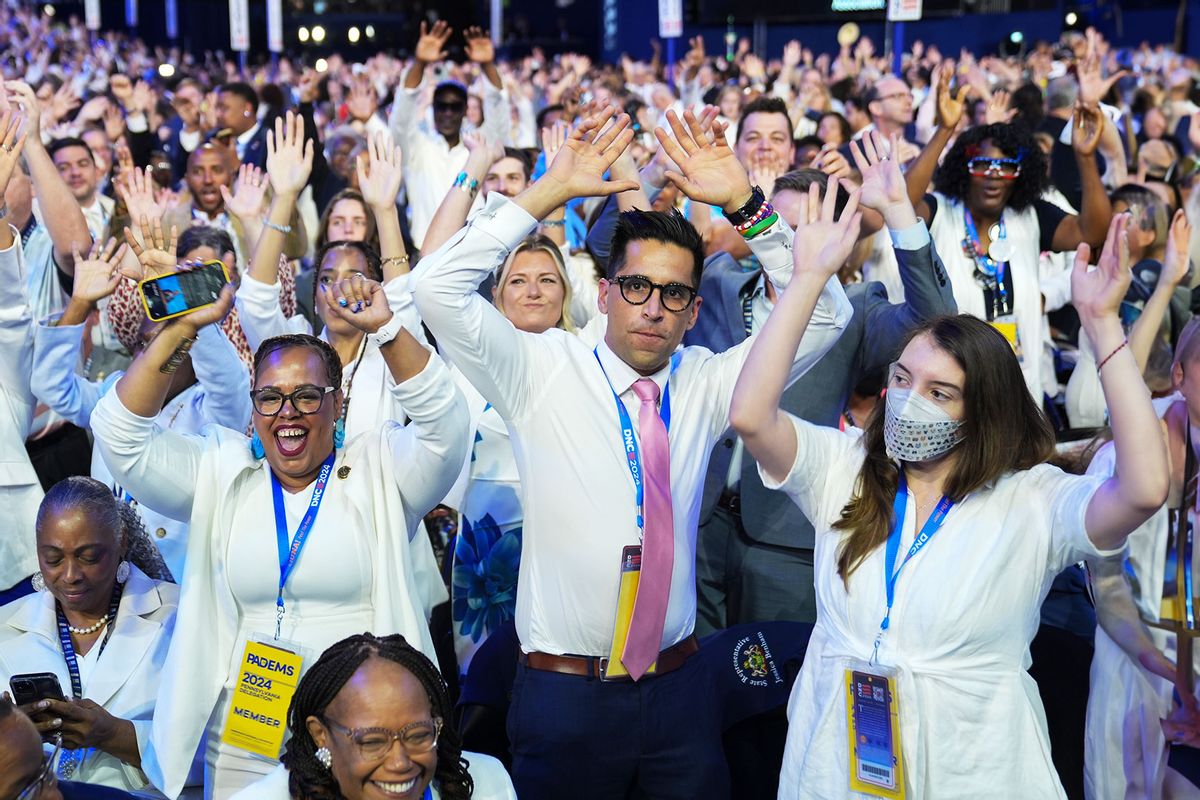Much has been written about the joy and hope that lit up the Democratic convention. Little, however, has connected the festivities in Chicago to a basic human need to which the speeches, the music and, yes, the “vibe” touched off within us.
One of our most fundamental longings as social beings is to belong, especially to a community. Community is “our survival,” Francis Moore Lappe, author of Democracy’s Edge, has written. “It isn’t a luxury, a nice thing; community is essential to our well-being.”
In Vice President Kamala Harris’ nomination acceptance speech were recurring themes speaking to Americans’ yearnings to feel their country as one of “common unity”:
I see an America where we hold fast to the fearless belief that built our nation. . . An America where we care for one another, look out for one another, and recognize that we have so much more in common than what separates us.
She struck this parallel note:
Our nation, with this election, has a precious, fleeting opportunity to move past the . . . divisive battles of the past, a chance to chart a new way forward . . . Not as members of any one party or faction. But as Americans.
Note the duality here: The Vice President was urging a way to the future that revives a time still fresh in memory —the “fearless beliefs” of the pre-Trump era. At the convention, you heard that echo as Barack Obama picked up the crowd chant, “Yes, SHE can,” reminding us of the powerful meme in electing 44: “Si, se puede” . . . Yes WE can.”
The “WE” remains the forceful message of community. Joining with family, neighbors and fellow Americans matters to both our personal and national well-being. In recent years, we've seen the opposite effects that can come from invasive nature or our adversaries’ attempts to weaken us.
As to nature, the 2020 - 2022 pandemic exacted terrible human costs by isolating us from one another. As writer Jade Warner put it in November 2022: “Losing our ability to interact and socialize freely” took a serious toll, because “belonging to a community, being able to engage with others, and forging authentic relationships are all critical parts of being human.”
As to our adversaries, recall how divisiveness was fed by Russian President Vladimir Putin, Trump’s hero and foreign meddler in our elections. His goal in unleashing Russian troll farms and bots on the electorate in 2016 was not only to help elect Trump, but also to “sow discord” and “spread distrust,” as Special Counsel Robert S. Mueller’s indictment of 13 Russian intelligence agents testifies. Russian state media continues to “amplify political divisions” in the United States today. He understands that a house divided cannot stand.
Likewise, Trump’s ongoing message is that what separates us is far more important than what we have in common. (Note the mirror image of the Vice President’s theme.) Look no further than the former president’s clearly rehearsed “shock statement” to the National Association of Black Journalists on July 31 that Kamala Harris had only recently “turned black.” For whites, that statement sought to cast her as “other.” For Indian American and Black voters, the statement sought to separate her racial identity from theirs.
We need your help to stay independent
Kamala Harris knew exactly what Trump was doing. That night, she called him out: “We deserve a leader who understands that our differences do not divide us — they are an essential source of our strength.”
That message resonates with the evolutionary history inside our DNA. As neurologist and psychologist Dr. Stephen Braren has described:
Humans have survived for thousands of years through our ability to connect, communicate, and cooperate with each other. . . . Put simply, there was strength and safety in numbers. . . . Being connected in groups permitted the growth of the extended family to help one another parent and raise children, promoting survival.
It takes a village.
No one should mistake the resonance of the vice president’s message with an election already won. As Peter Baker just reminded us in the New York Times, “History is littered with presidential candidates who roused their partisans at conventions only to fall short come November.” A presidential campaign is won on the ground by actual volunteers getting out the vote in the weeks to come.
Still, Kamala Harris’ convention smartly and capably planted energizing joy and hope firmly in the firm soil of our human need to come together — especially after a catastrophic pandemic like COVID turned the earth on its head. There is more than momentum in that planting. There is power.



Shares